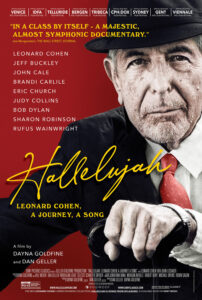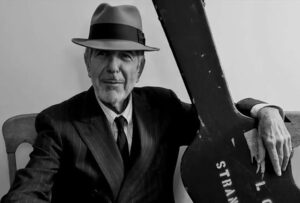Film Review: “Hallelujah: Leonard Cohen, a Journey, a Song” Is Repetitive but Interesting
Written by: Matthew Anderson | June 29th, 2022

Hallelujah: Leonard Cohen, a Journey, a Song (Daniel Geller/Danya Goldfine, 2021) 2½ out of 4 stars.
The documentary Hallelujah: Leonard Cohen, a Journey, a Song discusses singer-songwriter Leonard Cohen’s life in great detail, from his birth to an Orthodox Jewish family living in Quebec to pursuing a career in poetry during the 1950s through the mid-60s. In 1967, he started a music career creating his first few albums with a folk-music style, followed by an acoustic style with jazz, East Asian, and Mediterranean influences on his sixth album, Recent Songs. Shortly afterwards, Leonard recorded Various Positions, which featured the most famous song of his catalog, “Hallelujah.” Despite gaining a mixed reaction in 1984, the song gained a cult following over the years as artists such as John Cale and Jeff Buckley brought it back into the public spotlight. It is more popular now than it was back when it was first released, especially when films like the 2001 Shrek have featured their own rendition of the ballad.
Prior to watching this documentary, I wasn’t that familiar with Leonard Cohen. However, the one song I did know was “Hallelujah,” since Cohen’s version of it was included in Zack Snyder’s 2009 Watchmen. Regardless, it was interesting to see this documentary examine aspects of his life, both spiritually and personally, as well as how the song itself inspired so many takes of what was once considered a single of decidedly mixed reception.

The film provides an interesting look into Leonard’s process of writing his songs as he reportedly wrote over 100 versions of the titular track. I personally wished it had been able to dive more deeply into his inspirations for the music he created, as I felt the directors, Daniel Geller and Dayna Goldfine (The Galapagos Affair: Satan Came to Eden), were more interested in exploring how popular and impactful the song itself was for future generations. I had no issue with that aspect of it, as some of the stories told were compelling, at times, but they also felt repetitive to me in terms of the way the interviews were presented.
If nothing else, I admired two things about the movie: 1) I could sense the passion the directors have for the material; and 2) despite my personal issues with the narrative, I do want to dive more into Cohen’s music as this was my first introduction to his overall work as a musician. At the end of the day, I would recommend this ballad to be heard, especially for those who are curious to know more about Cohen’s life and creative output.


